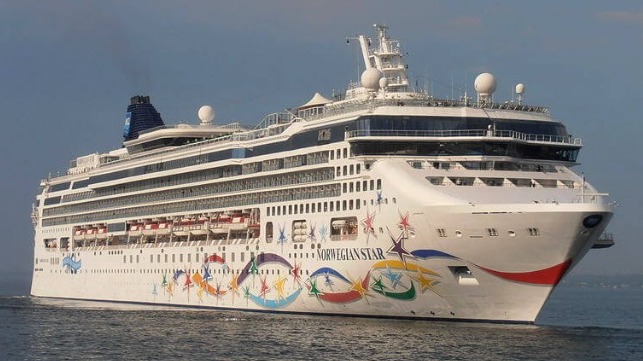Jury Awards Norwegian $159M in Damages From Azipod Dispute with ABB

Norwegian Cruise Line recently won a jury verdict in a long-running dispute with ABB stemming from the failure of Azipod propulsion units on four of Norwegian’s 18 cruise ships. The jury awarded Norwegian nearly $159 million in compensatory and punitive damages related to ABB’s actions after the 2017 failure of the propulsion system aboard the cruise line’s Norwegian Star left the ship stranded at sea and subsequent failures aboard the three other cruise ships operated by Norwegian Cruise Line. The cruise line contends the failures resulted in canceled cruises, expenses related to compensating passengers, repairs to the ships, and lost revenues.
The case filed in Miami Dade Circuit Court in January 2020 alleged that ABB was aware of problems in the propulsion system but failed to disclose it to Norwegian and made misleading statements to Norwegian after the first system failure. According to the complaint, ABB, the manufacturer of Azipods, misrepresented the reliability and safety of the propulsion system. The case involved the VO2300 model of Azipods, some of the earliest produced models. Court papers said the model was deployed on 16 cruise ships, including the Norwegian Star built in 2001, as well as the Norwegian Gem, Norwegian Jade, and Norwegian Pearl, which were introduced in 2006 and 2007.
After a month-long trial, the jury found for Norwegian agreeing that ABB made fraudulent and negligent misrepresentations after the 2017 failure on the Norwegian Star. The jury agreed that ABB had a duty to disclose information and had made omissions in its disclosures. The jury awarded $31.75 million in compensatory damages based largely on Norwegian’s out-of-pocket expenses compensating passengers. In addition, they were awarded $127 million in punitive damages.
A spokesperson for ABB confirmed the jury decision. Eike Christian Meuter, Senior Media Relations Manager for ABB Asea Brown Boveri said, “We strongly disagree with the outcome and will challenge the decision including a possible appeal to a higher state court.”
Azipod propulsion was first installed on cruise ships in the late 1990s. It is a gearless steerable propulsion system where the electric drive motor is housed within a pod outside the ship hull. According to ABB, the advantage offered for cruise ships is that the units, which can rotate 360 degrees, increasing maneuverability and operating efficiency, while cutting fuel consumption.
Norwegian in its complaint contends that ABB was aware of cracks appearing in the sheathing for the exciter element of the units exposing wiring. They contend that ABB knew that the exciters in the VO model were likely to fail due to these cracks but kept this information from Norwegian and instead told management that failures were extremely rare. During the trial, Norwegian’s lawyers pointed to a 2012 report in which ABB-affiliated field engineers and technicians began observing visible cracks on the Azipods’ exciter stators.
“NCL's claims were based on fraudulent and negligent misrepresentations and omissions based on ABB misrepresenting (and omitting material information) about the reliability of the exciters in Azipods,” said Alex M. Gonzalez. Partner at Holland & Knight and one of the lead litigation attorneys on the case. “NCL believed its exciters were reliable and not in danger of failing,” said Gonzalez.
The Norwegian Star experienced the first failure on December 11, 2016, in its starboard Azipod. ABB installed an emergency exciter kit adapting the Azipod for operation so that the ship could continue to sail and did not need to enter dry dock for repairs. However, on January 24, 2017, the portside Azipod also failed and before repairs could be made, on February 9 the starboard Azipod again failed this time leaving the vessel without propulsion power at sea with 2,113 passengers and 1,017 crew. The cruise ship had to be towed 75 miles to Melbourne, Australia.
After the failure, Norwegian was working with ABB and in March 2017 instructed that the exciters be inspected on the other vessels. The crews aboard the Norwegian Gem, Jade, and Pearl each reported that they had discovered cracks on the exciters. Norwegian alleges that ABB recommended repairs while “omitted critical information that any repairs would not rectify any damage already done.”
The Norwegian Gem suffered an exciter-related starboard Azipod propulsion failure in November 2017, which Norwegian alleges was identical to the prior two incidents aboard the Norwegian Star. A year later, in November 2018, the Norwegian Jade’s starboard Azipod also failed due to the exciter and in July 2019 the exciter failed in one of the Norwegian Pearl’s Azipods.
The jury found for ABB agreeing that ABB did not have a “duty to disclose” prior to the failures on the Norwegian Star. They also found for ABB on the issue of fraudulent or negligent omission of information before the two failures on the Norwegian Star.
The four cruise ships all continue to be active parts of Norwegian’s fleet. Further, despite this dispute, Norwegian has an ongoing business relationship with ABB employing its Azipod units for its subsequent newbuilds. Despite various problems cruise lines experienced with the early versions of pod propulsion, the Azipod continues to grow in popularity for propulsion on large cruise ships being built around the world.
Top photo by Pjotr Mahhonin (CC BY-SA 3.0)
